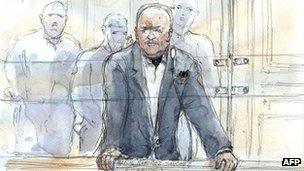Carlos the Jackal appeals against life term in France
- Published

Ilich Ramirez Sanchez, alias Carlos the Jackal, describes himself as a professional revolutionary
Self-styled revolutionary "Carlos the Jackal" has returned to court in Paris to appeal against his life sentence for deadly attacks in France in the 1980s.
The Venezuelan, whose real name is Ilich Ramirez Sanchez, has always denied playing any role in the bomb attacks that killed 11 people.
Ramirez, who is also serving a life sentence for a triple murder in 1975, asked to be given a new lawyer.
The 63-year-old was captured by French special forces in Sudan in 1994.
By that time he had earned global notoriety as a mastermind of deadly bomb attacks, assassinations and hostage-takings.
Bomb attacks
Ramirez began Monday's hearing by saying he had decided to drop his lawyers and asking for a court-appointed defence team.
"I have forbidden my lawyers from coming to defend me," he was quoted as saying by AFP news agency.
The Venezuelan authorities, he argued, had refused to cover his court costs.
Ramirez is now expected to argue that the evidence that led to his conviction in 2011 was fundamentally unreliable.
Prosecutors had struggled to secure a conviction until the release of secret files from East Germany's notorious secret police, the Stasi.
During his trial in 2011, Ramirez described himself as a "man of combat" and a "professional revolutionary".
"I am a living archive. Most of the people of my level are dead."
He also read a text in memory of former Libyan leader Muammar Gaddafi, who is known to have funded anti-Western attacks.
His convictions in France relate to attacks in 1982-83
In March 1982, a bomb exploded on a train between Paris and Toulouse, killing five people and wounding 28.
A month later a car bomb attack was mounted on an anti-Syrian newspaper in Paris, with one passer-by killed and 60 injured
On New Year's Eve 1983, a bomb on a TGV fast train between Marseille and Paris killed three people and wounded 13, and a bomb at a Marseille train station killed two
Ramirez was born into a wealthy Venezuelan family and studied in Moscow before joining the Popular Front for the Liberation of Palestine. He converted to Islam in 1975.
He got his nickname after a copy of Frederick Forsyth's novel The Day of the Jackal was found among his belongings.